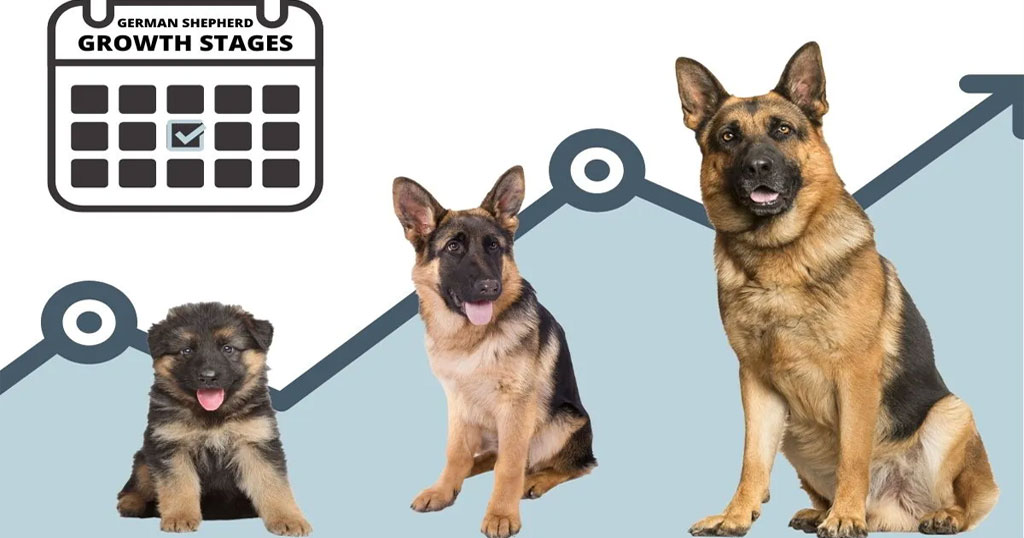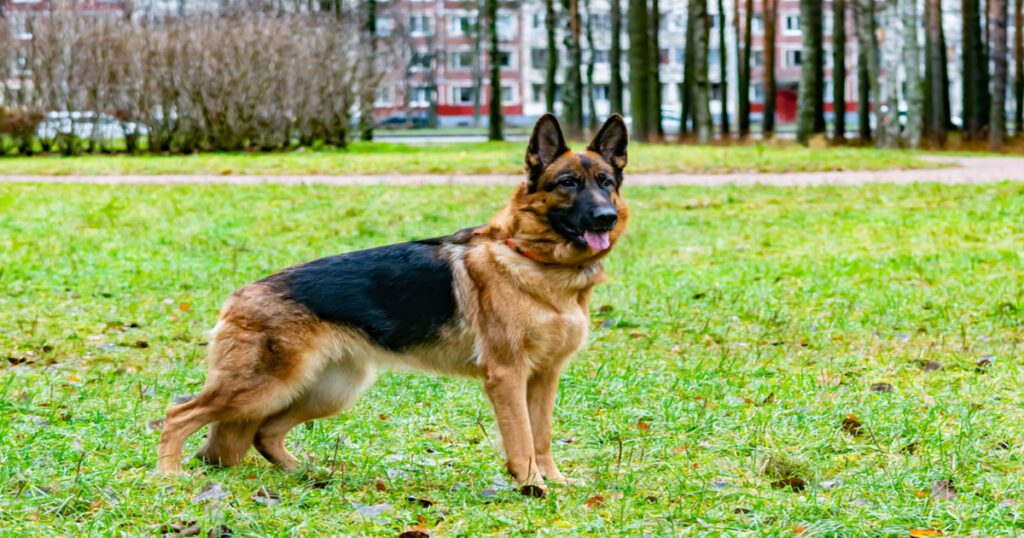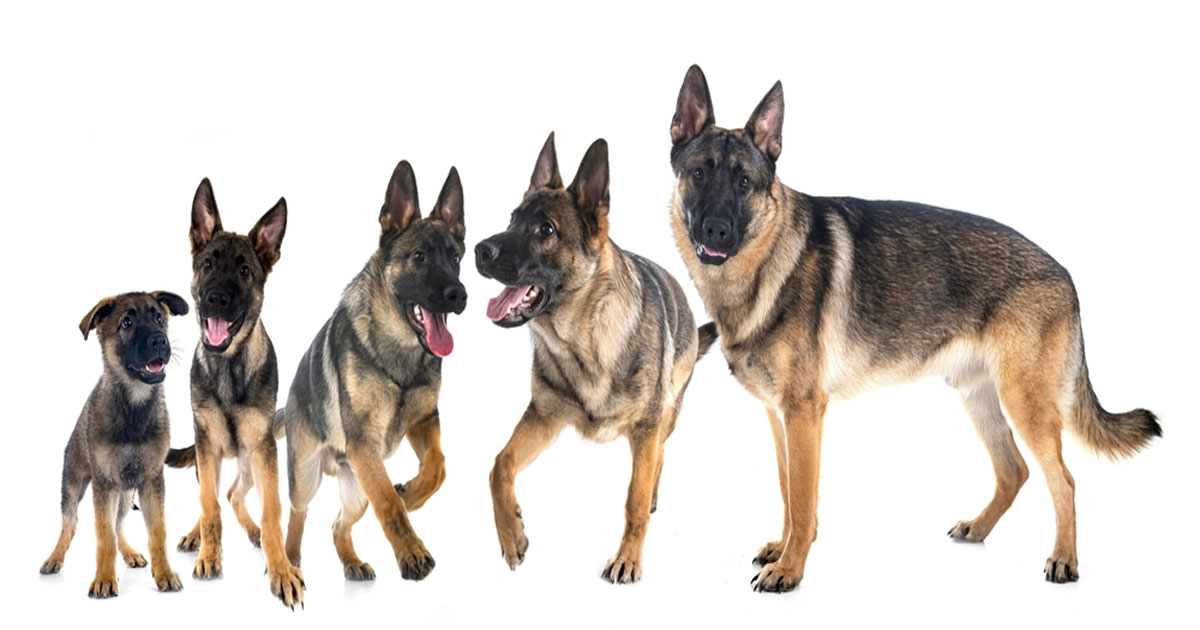When Do German Shepherds Stop Growing Are you a proud owner or a potential adopter of a German Shepherd? Understanding the growth stages of these magnificent dogs is essential for their overall well-being.
German Shepherds typically reach their full height and length between the ages of 12 to 18 months. They may continue to fill out and gain muscle mass until they are around 2 to 2.5 years old.
The exact timing can vary from dog to dog, as growth rates can be influenced by genetics, nutrition, and overall health.
It’s important to note that while most When do German Shepherds will stop growing by 2.5 years, their development and maturity in terms of behavior and temperament can continue for several more years.
Table of Contents
In this comprehensive guide, we will delve into the topic of when German Shepherds stop growing. Additionally, we will explore factors that affect their growth and provide tips to support their healthy development. Let’s dive in!
Growth Phases – When Do German Shepherds Stop Growing
German Shepherds, like all dogs, go through distinct growth phases from birth to adulthood. Owners need to have a basic understanding of these stages to ensure proper care and support throughout their pet’s development.
They reach their full height and length between the ages of 12 to 18 months. The exact timing can vary from dog to dog, as growth rates can be influenced by genetics, nutrition, and overall health.
Most of when do German Shepherds will stop growing by 2.5 years, their development and maturity in terms of behaviour and temperament can continue for several more years.
The Stages of Growth of German Shepherds: Newborn to Adulthood
| Growth Phase | Age Range | Key Characteristics |
| Newborn Period | Birth to 2 weeks | Dependent on mother, blind, deaf, and fragile |
| Socialization Period | 3 to 12 weeks | Learning social skills, exploration, and bonding |
| Juvenile Period | 3 to 6 months | Rapid growth, increased energy levels |
| Sexual Maturity | 6 to 12 months | Males become sexually active, females have heat |
| Maturity Stage | 2 to 3 years | Full physical and mental maturity reached |
Newborn Period
The journey begins with the newborn period, which lasts from birth until around two weeks. During this time, German Shepherd puppies are entirely dependent on their mother for nourishment and warmth. They are born blind, deaf, and unable to regulate their body temperature.
Socialization Period
Between the ages of 3 and 12 weeks, German Shepherd puppies enter the critical socialization period. This phase is crucial for their emotional and behavioural development. It’s during this time that they start exploring their surroundings, interacting with littermates and humans, and learning important social skills.
Juvenile Period
Around 3 to 6 months, German Shepherd puppies enter the juvenile period. This stage is characterized by rapid growth and increased energy levels. They may experience a growth spurt during this time, with noticeable changes in their size and weight.
Sexual Maturity and Reproductive Period
Between 6 and 12 months, German Shepherds reach sexual maturity. Female dogs may experience their first heat cycle, while males become sexually active. It’s important to consider spaying or neutering during this stage, as it helps prevent unwanted pregnancies and offers certain health benefits.
Maturity Stage
German Shepherds typically reach full physical and mental maturity between 2 to 3 years of age. However, individual dogs may vary. During this stage, their growth rate slows down, and their body proportions become more balanced. It’s important to monitor their diet, exercise, and overall health to maintain their optimal well-being.
German Shepherd Growth Chart
Understanding the growth trajectory of German Shepherds can be made easier with the help of a growth chart. Below is a general overview of the average height and weight ranges at different stages of their development.
It’s important to note that individual dogs may deviate slightly from these averages.

German Shepherd Growth Chart
| Age Range | Average Height (Male) | Average Height (Female) | Average Weight (Male) | Average Weight (Female) |
| 3 months | 16-20 inches | 15-19 inches | 35-45 pounds | 30-40 pounds |
| 6 months | 21-24 inches | 20-22 inches | 50-65 pounds | 45-60 pounds |
| 12 months | 24-26 inches | 22-24 inches | 65-85 pounds | 55-75 pounds |
| Fully grown | 24-26 inches | 22-24 inches | 65-90 pounds | 55-75 pounds |
Factors Affecting the Growth of German Shepherds
When Does the Height of a German Shepherd Stabilize?
The height of a German Shepherd generally stabilizes between 12 to 18 months, although some dogs may continue to experience minimal growth until they are fully grown at around 2 to 3 years.
Proper nutrition, genetics, and overall health play a significant role in determining the final height.
When Does the Weight of a German Shepherd Stabilize?
Similar to height, the weight of a German Shepherd stabilizes around 12 to 18 months. However, it’s essential to monitor their weight throughout their life to prevent obesity or excessive weight gain, which can lead to various health issues.
Signs of a German Shepherd Reaching Full Growth
Apart from the typical age ranges mentioned above, certain signs indicate that a German Shepherd is reaching full growth.
These signs include the closing of growth plates in their bones, a more balanced body proportion, and a stable temperament. It’s important to consult with a veterinarian to assess the individual dog’s growth progression.
Remember, providing a nutritious diet, regular exercise, and proper veterinary care is crucial for their optimal growth and well-being.
Common Growth Issues in German Shepherds
Some common growth issues can affect them. Being aware of these issues can help you identify potential problems and seek appropriate veterinary care. Here are a few growth-related issues commonly seen in German Shepherds:

Hip and Elbow Dysplasia
German Shepherds are prone to hip and elbow dysplasia, which are conditions where the joints do not develop properly. This can cause lameness, pain, and difficulty in movement.
Regular exercise, maintaining a healthy weight, and proper breeding practices can help reduce the risk of these conditions.
Panosteitis
Also known as “growing pains,” panosteitis is a condition where the long bones in a German Shepherd’s legs become inflamed. It usually occurs during the rapid growth phase and can cause intermittent lameness and discomfort.
With proper rest, pain management, and a balanced diet, most dogs recover from pan osteitis.
Osteochondritis Dissecans (OCD)
OCD is a condition that affects cartilage and bone development in young German Shepherds. It can lead to joint pain, stiffness, and limping. Early diagnosis and appropriate treatment, which may include surgery in severe cases, can help manage OCD effectively.
Bloat
While not directly related to growth, bloat is a life-threatening condition that German Shepherds can be susceptible to. It occurs when the stomach fills with gas and twists, leading to restricted blood flow and potential organ damage.
Feeding multiple small meals, avoiding exercise immediately after meals, and monitoring your dog’s eating habits can help prevent bloat.
Dental Issues
German Shepherds, like many large breeds, can experience dental problems. These may include misalignment, overcrowding, or dental plaque buildup.
Regular dental care, such as teeth brushing and professional cleanings, can help maintain good oral health.
Remember, regular veterinary check-ups, a nutritious diet, and a supportive environment will contribute to the healthy growth and overall well-being of your German Shepherd.
Frequently Asked Questions
Q: At what age is a German Shepherd full-grown?
Ans: German Shepherds are generally considered full-grown between 2 to 3 years of age.
Q: At what ages do German Shepherds have growth spurts?
Ans: German Shepherds often experience growth spurts between 3 to 6 months of age.
Q: Why is my German Shepherd not growing?
Ans: Several factors can contribute to a German Shepherd not growing as expected, including genetics, nutrition, health issues, or inadequate care. Consulting with a veterinarian can help determine the underlying cause.
Q: At what age do German Shepherds stop having puppies?
Ans: Female German Shepherds typically stop having puppies around 7 to 8 years of age, although individual variations may occur.
Q: At what age do German Shepherds die?
Ans: The lifespan of German Shepherds can vary, but on average, they live between 10 to 12 years.
Q: When do German Shepherds’ ears stand up?
Ans: German Shepherds’ ears usually start to stand up between 8 to 16 weeks of age, but it can vary for each individual. Some may have fully erect ears by 6 months.
Q: When do German Shepherds stop teething?
Ans: German Shepherds typically stop teething around 6 to 8 months of age when their adult teeth have fully emerged. During this period, providing appropriate chew toys can help alleviate discomfort and prevent destructive chewing.
Conclusion
In conclusion, understanding when German Shepherds stop growing is essential for every owner. While the height and weight of German Shepherds typically stabilize between 12 to 18 months, it’s important to remember that individual dogs may have slight variations.
Factors such as genetics, nutrition, and overall health play significant roles in their growth. So, if you’re eagerly awaiting the day when your German Shepherd reaches their full size, rest assured that with proper care and attention, that day will come. Good luck!

I’m David, an expert contributor and writer, with two furry friends of my own, I know the challenges of raising and caring for dogs. From training to nutrition and health, my goal is to provide valuable insights and advice to help create strong bonds and happy, healthy lives. Find me in Twitter.




